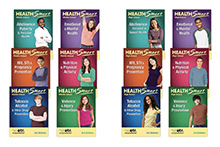How the National Health Ed Standards Support SEL
By Suzanne Schrag
HealthSmart Series Editor
.png) Health education has always been a natural fit for Social and Emotional Learning (SEL). The National Health Education Standards (NHES) strongly support the key SEL competencies outlined by the Collaborative for Academic, Social and Emotional Learning (CASEL):
Health education has always been a natural fit for Social and Emotional Learning (SEL). The National Health Education Standards (NHES) strongly support the key SEL competencies outlined by the Collaborative for Academic, Social and Emotional Learning (CASEL):
- Self-awareness
- Self-management
- Social awareness
- Relationship skills
- Responsible decision making
Meeting the National Standards can strengthen these SEL competencies in many ways. Let's look more closely at how they relate to each other.
Decision Making: One of the most obvious links is promoting responsible decision making. Standard 5 in NHES states that “Students will demonstrate the ability to use decision-making skills to enhance health.” This skill builds as we move through the grade levels, from being able to identify when a decision is required and understanding whether assistance is needed in Grades K–2, to following a decision-making model with distinct steps at the upper grade levels. Part of responsible decision making is understanding the value of making thoughtful decisions, being able to examine circumstances or barriers that can hinder healthy decision making, understanding when help might be needed to make a decision, and then generating alternatives or options, predicting the potential outcomes of each possible choice, and choosing healthy over unhealthy alternatives. Looking at the results of a decision to analyze the outcomes or effectiveness of that decision is an important final step in building the skill for the future.
Goal Setting: Standard 6 focuses on setting goals, which is an important component of self-management, and also contributes to self-awareness, as students explore and evaluate current behaviors to identify strengths and challenges before choosing an area for improvement.
Self-Management: This SEL skill is also the focus of Standard 7, the ability to practice health-enhancing behaviors and avoid or reduce risks. The practice of this standard can range from instilling hygiene habits to managing stress or controlling impulses when experiencing anger and other strong emotions.
Analyzing Influences: Standard 2, which addresses the ability to identify and critically assess both internal and external influences, certainly contributes to self-awareness as students look at how various influences seek to affect their behaviors and health choices, and evaluate which are most powerful—in both positive and negative ways. Analyzing influences can also contribute to social awareness, helping students consider how others’ actions and beliefs—particularly those of peers—can affect their own behavior.
Communication: Various communication skills are addressed by Standard 4. Communication is probably the skill most intimately connected to building healthy relationships. Lessons that focus on clear and effective communication help students build and maintain their important relationships. Refusal and negotiation skills can help them stand up for themselves and their choices (self-awareness) and act in their own best interests without alienating others. Conflict resolution skills serve healthy relationships, as well as promote respect and empathy for others (social awareness) as students learn how to consider and show respect for the other person’s point of view when disagreements arise.
Accessing Resources: Standard 3 is concerned with assessing and accessing valid and reliable resources. This skill contributes to building healthy relationships, as students identify and develop support networks with parents, guardians or other trusted adults who can help them with health-related concerns. It also touches on responsible decision making—Do they need more information to make a decision? Where can they find that information and how do they know the source is reliable?—and self-management—what resources can help them achieve their health goals?
Advocacy: Sharing health messages and persuading others to adopt healthy behaviors is the focus of Standard 8. Advocacy connects to relationship skills, as students communicate their knowledge and perspectives to help family members, peers and other important people in their lives, and can touch on social awareness as well when they engage in campaigns to improve school or community health. Self-awareness also comes into play, as students consider what they have learned and how their beliefs may have changed as a result, and then choose the message they feel is most important to share to help others.
Suzanne Schrag is the Senior Curriculum Editor at ETR. She is the series editor for the HealthSmart program, and a co-author of the second edition of Grades K–5.


